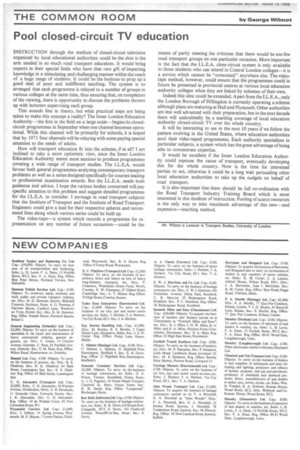Pool closed-circuit TV education
Page 84

If you've noticed an error in this article please click here to report it so we can fix it.
INSTRUCTION through the medium of closed-circuit television organized by local educational authorities could be the shot in the arm needed in so much road transport education. It would bring experts in their special fields who have that rare gift of imparting knowledge in a stimulating and challenging manner within the reach of a huge range of students. It could be the buttress to prop up a good deal of poor and indifferent teaching. The system is so arranged that each programme is relayed to a number of groups in various colleges at the same time, thus ensuring that, on completion of the viewing, there is opportunity to discuss the problems thrown up with lecturers supervising each group.
This sounds fine in theory, but what practical steps are being taken to make this concept a reality? The Inner London Education Authority—the first in the field on a large scale—begins its closedcircuit programmes in September when one channel becomes operational. While this channel will be primarily for schools, it is hoped that by 1971 four channels will be relaying with some paying special attention to the needs of adults.
How will transport education fit into the scheme, if at all? I am inclined to take a more optimistic view, since the Inner London Education Authority seems most anxious to produce programmes covering a wide range of transport studies. The I.L.E.A. would favour both general programmes analysing contemporary transport problems as well as a series designed specifically for courses leading to professional examination awards. But the I.L.E.A. needs both guidance and advice. I hope the various bodies concerned will pay specific attention to this problem and suggest detailed programmes for the I.L.E.A. to consider. I envisage in road transport subjects that the Institute of Transport and the Institute of Road Transport Engineers could give a lead for their respective spheres and recommend lines along which various series could be built up.
The video-tape—a system which records a programme for representation on any number of future occasions—could be the means of partly meeting the criticism that there would be too few road transport groups on one particular occasion. More important is the fact that the I.L.E.A. close-circuit system is only available to those students who can attend in Central London colleges—it is a service which cannot be "consumed" anywhere else. The videotape method, however, could ensure that the programmes could in future be presented in provincial centres at various local education authority colleges when they are linked by schemes of their own.
Indeed this idea could be extended. Apart from the I.L.E.A., only the London Borough of Hillingdon is currently operating a scheme although plans are maturing at Hull and Plymouth. Other authorities are less well advanced with their preparation, but in the next decade there will undoubtedly be a startling coverage of local education authority closed-circuit TV over the whole country.
It will be interesting to see in the next 10 years if we follow the pattern evolving in the United States, where education authorities pool their video-taped programmes. Each authority specializes in particular subjects, a system which has the great advantage of being able to concentrate expertise.
It would be excellent if the Inner London Education Authority could espouse the cause of transport, eventually developing this for the whole country. Now is the time for interested parties to act, otherwise it could be a long wait persuading other local education authorities to take up the cudgels on behalf of road transport.
It is also important that there should be full co-ordination with the Road Transport Industry Training Board which is most interested in this medium of instruction. Pooling of scarce resources is the only way to take maximum advantage of this new—and expensive—teaching method.




































































































































